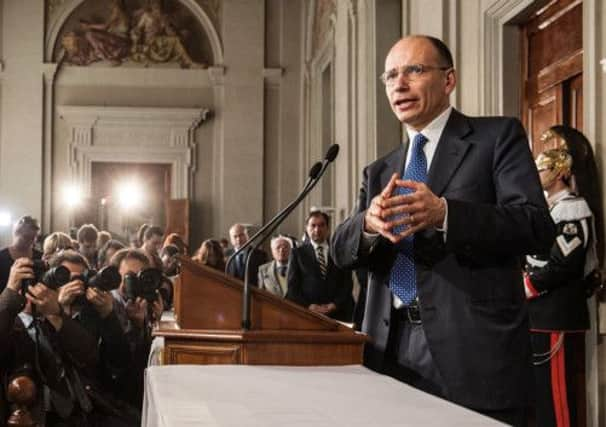Italy: Enrico Letta nominated as new prime minister


Enrico Letta, 46, the former deputy leader of the centre-left Democratic Party, will become Italy’s youngest prime minister in a quarter of a century if he can obtain the backing of parliament, with a vote of confidence due in days.
The Democratic Party, outgoing prime minister Mario Monti and Silvio Berlusconi’s centre-right Freedom People party have all said they would back the candidate that president Giorgio Napolitano picked for premier, putting an end to the political turmoil launched in December when Mr Berlusconi pulled the plug on Mr Monti’s technocrat government.
Advertisement
Hide AdAdvertisement
Hide Ad“Italians can’t stand the little games played by politicians any longer,” said Mr Letta after he was charged with forming a government by Mr Napolitano yesterday.
“This country is waiting for a government, and everyone knows the situation cannot go on like this,” he added.
Mr Letta said his first task would be to institute reforms to stop the plague of firms closing down in Italy, “the sense of growing poverty” and “the young people leaving the country,” as the Italian economy plummets. He said he would reverse Mr Monti’s spending cuts, committing instead to “a change of course for European policies too focused on austerity which is no longer enough”.
Turning to Italy’s much- maligned political system, he said he would slash the number of MPs and reform Italy’s electoral law.
Mr Letta’s appointment marks a generational change in a political system dominated by men like Mr Napolitano, who will be 94 if he sees out his latest term in office.
Two months older than UK prime minister David Cameron, Mr Letta became Italy’s youngest minister in 1998 at the age of 32. A career politician, the native of Pisa rose through the ranks of the centre-left to become deputy leader of the Democratic Party in 2009.
Mr Letta describes himself as “post-ideological”, and has family ties to Mr Berlusconi’s inner circle. His uncle, Gianni Letta, is the media mogul’s long-time adviser and behind-the-scenes negotiator. When Enrico was appointed cabinet undersecretary in Romano Prodi’s 2006 government, he inherited the role from his uncle, and handed it back to him when Mr Berlusconi ousted Mr Prodi in 2008.
Married with three children, Mr Letta is a Dire Straits fan, a keen Subbuteo player and names Nelson Mandela among his heroes. A fluent English speaker and europhile, his profile as a moderate is set to calm markets alarmed by Italy’s political impasse.
Advertisement
Hide AdAdvertisement
Hide AdIn a perhaps scripted but nevertheless significant gesture, Mr Letta drove himself to the presidential palace to accept the job as premier in his own Fiat, with child seats in the back. Normally politicians are driven around with an accompanying motorcade. These “auto blu” have become the despised emblems of the privileges of Italy’s political elite – sentiments that led a quarter of Italians to vote for the anti-establishment 5-Star Movement, which campaigned on a platform of sending Italy’s traditional political classes packing.
A fan of the Pirates of the Caribbean series of films, Mr Letta warned a Democratic Party congress last year that the party, “should be a bit less Forrest Gump and a bit more like Johnny Depp’s pirate, Jack Sparrow.”
Mr Letta is stepping up to become prime minister as his party splits into angry factions weeks after it emerged as the strongest at the February elections, but without the majority required to form a government.
A battle in the party over choosing a new president – which pushed Mr Napolitano to accept a second term – led to the resignation of leader Pier Luigi Bersani over the weekend and the party may now split permanently over whether to back an coalition with Mr Berlusconi, the party’s sworn enemy for more than a decade.
Mr Letta may find the toughest resistance to his mandate comes from within his own ranks, not from his long time political foe Mr Berlusconi.